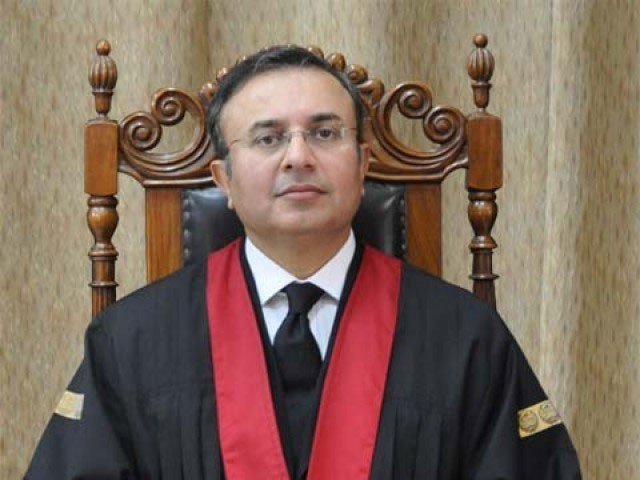
Supreme Court’s Justice Syed Mansoor Ali Shah has stressed upon the applicability of the National Accountability Ordinance (NAO), 2000 on superior courts judges and generals who are found guilty in the departmental disciplinary proceedings.
"This Court in Asfandyar observed that the non-applicability of the NAB Ordinance to the members of the Armed Forces and the judges of the Superior Courts is not discriminatory as they are held accountable under the Army Act 1952 and under Article 209 of the Constitution respectively,” Justice Mansoor said in his dissenting opinion against majority judgement striking down the amendments in NAB law.
A five-member bench of the apex court led by Chief Justice of Pakistan Qazi Faez Isa will take up the government plea against majority judgement today (Tuesday).
In his dissenting opinion, Justice Mansoor stated: “It appears that to secure the independence of these important national institutions, the Court made this observation in the context that if a member of the Armed Forces or a judge of a Superior Court is alleged to have committed an offence of corruption and corrupt practices, he is at first to be proceeded against by his departmental authority; once he is found guilty of such offence by his departmental authority and is removed from his official position, only then can he be investigated and tried under the anti-corruption criminal laws of the land, ie, the NAB Ordinance or the PCA as the case may be.”
The judge said, “If we do not read and understand the observations made by the Court in Asfandyar in this way, the legal position would be clearly hit by the basic constitutional value and the non-negotiable fundamental right of equality before law.
“The other holders of public offices, in addition to facing the civil consequences of their corruption and corrupt practices, are to suffer criminal punishment of undergoing the sentence of imprisonment and the forfeiture of the unaccounted-for assets, while the members of the Armed Forces and the judges of the constitutional courts would go scot-free in this regard.”
He added, “After removal from the official position, they would be set free to enjoy the assets accumulated by them through corrupt means.
“Such reading and understanding of the observation of the Court would allow the members of the Armed Forces and the judges of the constitutional courts to be unjustly enriched and then allowed to retain this unlawful enrichment without any accountability, this would make the members of the Armed forces and the judges of the constitutional courts untouchable and above the law; any such reading would be reprehensible and revolting to the conscience of the people of Pakistan and bring the Court into serious disrepute.
“We must, therefore, strongly shun the above generally professed opinion and be clear that members of Armed Forces and the judges of the constitutional courts are fully liable under the NAB Ordinance, like any other public servant of Pakistan.”
Justice Mansoor also expressed reservations on the locus standi of a parliamentarian to challenge the constitutional validity of an “Act of Parliament”.
"Parliament is a constitutional body, but being comprised of the chosen representatives of the people of Pakistan, it attains the status of a prime constitutional body.
“Any action made or decision taken by the majority of a constitutional body is taken to be and treated as an action or decision of that body as a whole comprising of all its members, not only of those who voted for that action or decision, such as a decision made by the majority of a Cabinet of Ministers, the majority of a Bench of this Court or of all judges in an administrative matter, the majority of the Judicial Commission of Pakistan or the majority of the Supreme Judicial Council, etc.”
Justice Mansoor said, “Can any member of these constitutional bodies who was in the minority in making that decision challenge the validity of that decision in court? Not, in my opinion. The principle that decisions taken by a majority of members in a constitutional body (like a parliament or legislature) usually cannot be directly challenged in court by those in the minority is rooted in the doctrine of parliamentary sovereignty and separation of powers."
He added, "Reference by the learned counsel for the petitioner and reliance of the majority on the cases of Corruption in Hajj Arrangements and Haris Steel Industries, submitted with respect, is misplaced as the executive actions impugned therein had a ‘direct and inevitable effect’, not ‘remote and uncertain effect’, on the fundamental rights of the people of Pakistan."
Justice Mansoor also noted that the counsel for the petitioner utterly failed to clearly establish beyond any reasonable doubt that the challenged amendments in the NAB Ordinance were constitutionally invalid on the touchstone of “taking away” or “abridging” any of the fundamental rights, in terms of Article 8(2) of the Constitution.
“I find the petition meritless and therefore dismiss it," he added.
Justice Mansoor also noted that if parliament can enact the NAB Ordinance, it can also repeal the entire law or amend the same.
"The legislature may, in its wisdom, after considering the recommendation either enhance or reduce the proposed threshold or may simply decide not to act upon that. The courts cannot force the legislature to act upon their recommendations nor can they strike down any law competently enacted by the legislature which does not commensurate with their recommendations."
Justice Mansoor also noted that elected office holders or members of parliament may commit corruption or corrupt practices, inter alia, through the following means:
(i) Bribery: by accepting bribes from individuals or businesses in exchange for political favors, contracts, or regulatory decisions.
(ii) Embezzlement: by misappropriating public funds for personal use, often by diverting money meant for public projects or services.
(iii) Kickbacks: by receiving a portion of money from contracts or projects awarded to specific companies in return for steering those contracts their way.
(iv) Nepotism and cronyism: by appointing family members or close associates to government positions or awarding them contracts without fair competition.
(v) Extortion: by forcing individuals or businesses to pay money through threats or coercion.
(vi) Money laundering: by concealing the origins of illegally obtained funds by making them appear legitimate through a series of transactions.
(vii) Shell companies: by creating fake companies to funnel money illicitly, making it difficult to trace the funds back to the corrupt politician.
(viii) Fraudulent land deals: by illegally acquiring public or private land and then selling it for personal gain.
(ix) Insider trading: by using non-public information gained through political office to make profitable investments in the stock market.
(x) Tax evasion: by underreporting income or using offshore accounts to hide money and avoid paying taxes.
Justice Mansoor said all these acts were triable for the offences of corruption and corrupt practices not only under the PCA and the PPC but they were also triable for different offences under the Income Tax Ordinance 2001, the Anti-Money Laundering Act 2010 and the Elections Act 2017, etc.




1732263441-0/BeFunky-collage-(81)1732263441-0-165x106.webp)
1732263755-0/musk-(3)1732263755-0-165x106.webp)


1732258132-0/BeFunk_§_]__-(26)1732258132-0.jpg)
1732257537-0/Copy-of-Untitled-(64)1732257537-0-270x192.webp)
1726722687-0/Express-Tribune-Web-(9)1726722687-0-270x192.webp)







COMMENTS
Comments are moderated and generally will be posted if they are on-topic and not abusive.
For more information, please see our Comments FAQ